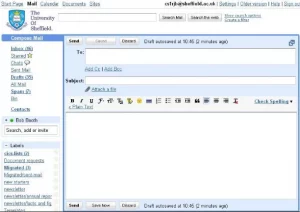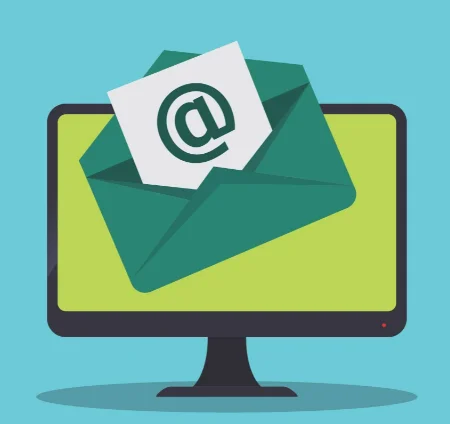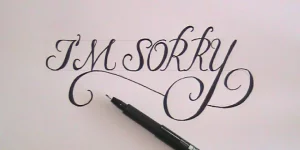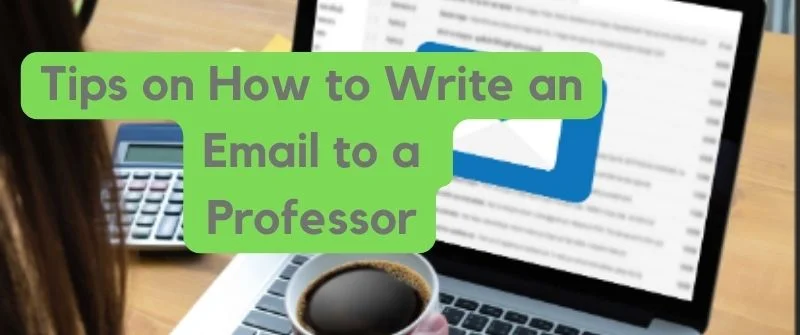It is common for students to ask their peers, mentors, and teachers for advice. Asking a professional or authority figure is not as easy as other emails because you ask them to invest their time. People give you honest feedback most of the time, but sometimes they are too busy.
This guide will show you exactly how to write an email to a professor so that they can help you succeed in your business school curriculum.
How to Write an Email to a Professor
Writing an email to your professor can be an anxiety-producing experience. However, if you follow the protocol below, you can rest assured that your actions are professional and appropriate. Here is how:
1. Write a clear subject line

The subject line of an email is probably the most crucial part of the message.
If a professor opens an email and sees no clear indication of what you are emailing about, they may delete it and move on to the next one.
A good way to start your subject line is with “Meeting Request” or something similar so that professors will know that you are trying to schedule a meeting with them.
You can then add more specifics about what you want to meet so that professors know how much time to set aside for your meeting.
If you have already talked with the professor before and have their permission, you can write a shorter message in the body of the email.
2. Open with a Greeting
Start by addressing your professor politely at the beginning of your email. You can use Dear Professor [Last Name]: or Hello Professor [Last Name]: as your greeting, depending on how well you know them outside of class.
You could also use Dear Dr. [Last Name] if they have a Ph.D., but this should only apply if they have asked you to address them this way in class or in-person otherwise, it may seem presumptuous.
3. Start with an Introduction
Let the professor know who you are, why you are writing and which class you are in. Use that first paragraph to let them know when and where they taught the class and whether or not you had another class with them before (and if so, which one).
4. Make Sure the Professor Knows you and your Work

The best reference letters come from professors who know the applicant well enough to describe their academic promise and abilities in specific terms.
The more specific the letter is, the more effective it will be.
If you have not taken any classes with this professor, it might be difficult for him or her to write a strong letter on your behalf.
5. Think about Whether this is the Right Person to Ask
Professors are busy people and receive many requests for letters of recommendation. As a result, sometimes professors may ignore emails when they are not very necessary.
therefore, it is important to make sure that you choose a professor who knows you well enough to write a strong letter and who can speak positively about your performance in class and/or research.
You should also consider whether or not they like you; when asked to write a letter of recommendation, some professors will consider how much they like their students as one factor in their decision to accept or decline the request.
6. Tell them Why you are Writing
When emailing a professor, state your purpose early on, usually in the first sentence or two. Think of this as the thesis statement for your email. It should tell your professor why he or she should read on.
For example, if you are writing because a professor has agreed to be a reference for an internship or job, say so immediately! If it’s because someone:
Reasons for Emailing Your Professor
To Talk about Grades
Your grading is different from what you expected, and you want to know why. If you have a question about your grade:
Make sure you know what the assignment was worth and what percentage of your final grade. If you had a paper worth 20% of your final grade and got a B on it, you are not doing as well in the class as you thought.
Look over the assignment carefully to see if there are any comments or instructions that would explain why you did not do as well as expected.
Most professors will write explicit instructions on how they expect an assignment to be done, and they will have specific notes about what they look for when grading the paper.
For Lateness Reasons

You write such an email if you want to request an excused absence from class.
If you need to miss class due to illness or another important matter and want to request an excused absence, it is always best practice to contact your professor as soon as possible.
Explain that you will not be able to attend class (or complete an assignment) and give a brief explanation as to why.
You may also offer an alternative solution if appropriate, such as enrolling in an online course or taking exams at a later date.
If you are only requesting time off for one day, include the date of the absence in the subject line of the email message. But if you are writing a late assignment email, be sure to include the homework name in the subject.
3. Asking a Question
You want to ask the professor a question about something unclear from class or the reading assignment. It is convenient if you are having trouble understanding the material.
This is so, especially if you have already tried talking to other students, attending office hours, and even reading the book more times than you would like to admit.
4. Asking for Notes
If you want to request notes for a course, don’t forget to include which course you’re emailing about. Also, it works well if you need extra notes to help you understand some sticky issues about a certain concept.
5. Asking for a Ph.D. Position
You may email your professor to confirm an appointment. It is a great way of knowing if there are more positions for Ph.D. in the departments.
6. For Research Concerns
If you are requesting research, do not forget to include what you want to research. Professors are a great resource if you want some direction on which course to take while you are doing your research.
Is It Good to Start with Dear Professor Email?

Sometimes students are not sure how to begin an email with their professor. It can be difficult to know the best way to address someone in an email message.
When writing an email message to a professor, it is important to use an appropriate greeting and make sure that your email content is clear and concise.
Here are some tips and examples of how to start an email message.
Email Greetings for Professors
Some professors prefer you address them by their first name, while others ask you to use a title like Dr. or Professor. If you are unsure how your professor would like to be addressed, try addressing him or her by his or her last name in your first email. For example:
Dear Professor Smith,
Hi Professor Smith,
If you have been communicating with the professor via email already and have signed off using his or her first name, it’s fine to use that in subsequent emails.
However, if he or she used a title (Dr., Professor) in previous messages, make sure to use that when replying as well.
If you are not sure whether it is okay to address your professor using his or her first name, check with other students in the class who may have communicated with the professor via email before.

I am an educational writer and blogger focussing on tech, education, and life improvement.
